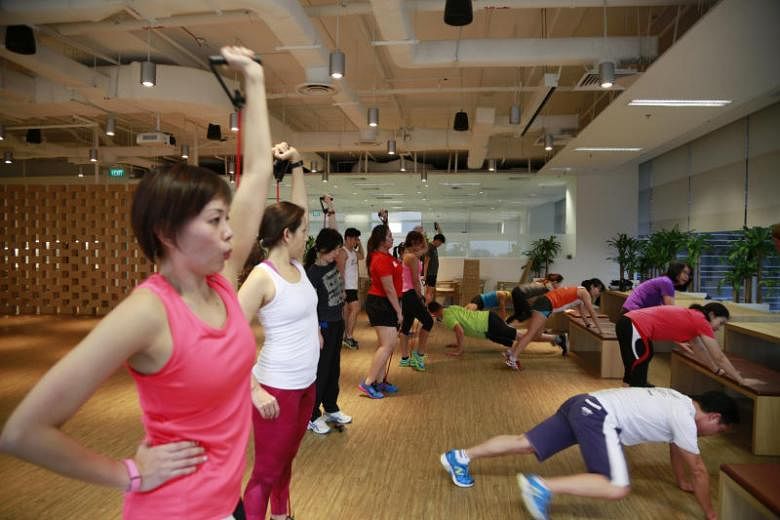Prime Minister Lee Hsien Loong's National Day Rally 2017 speech was a refreshing departure from those of previous years, which focused primarily on economic issues. Choosing to focus on diabetes as one of Singapore's longer-term issues was a timely rallying call for Singaporeans to take health and wellness seriously and start making real lifestyle changes. A tall order, but as PM Lee rightly said, "It takes effort but it can be done."
In fact, for the past three years, Singapore has put in place system-level changes to make healthy living easy.
In 2014, the Ministry of Health released the Healthy Living Master Plan. It signalled a dramatic departure from the traditional general health education approach, which assumes that an individual with the right knowledge will go on to adopt the right attitude and pick up healthy lifestyle habits. Research has proven that this is not always the case.
The master plan envisions making healthy living natural and effortless with its "3Ps strategy" focusing on: place - to provide a conducive environment for healthy living; people - to build a socially inclusive community for healthy living; and price - giving affordable options for healthy living.
Similarly, the Urban Redevelopment Authority and Land Transport Authority have outlined several "car-light" initiatives aligned with this vision by reducing the need to commute by car. Singapore's cycling path network will increase from today's 230km to 700km by 2030. Underground pedestrian walkways will be expanded - for example, the new Marina South downtown will be linked to the old Central Business District via 30km of underground walkways. Workplaces are being built closer to homes in areas including, Woodlands, Punggol and Tampines. These measures will not only create a more liveable city, but also make it conducive for walking or cycling to work.
With such infrastructural changes in place, Singaporeans will have more avenues to increase daily physical activity levels, and not simply through more sports. Indeed, many people mistakenly think that only vigorous sports activity can help prevent diabetes when, in fact, moderate activity levels will increase the insulin sensitivity of our skeletal muscles and lead to more efficient utilisation of glucose and regulation of blood sugar levels.
It is more challenging on the food front though. With our large number and wide variety of food outlets, it would be more strategic to focus efforts on food sellers such as supermarkets. A consumer would be more inclined to pick up the healthier choice of a brown-and-white-rice mix convenient pack prominently displayed on shelves. A soda tax, while sending a powerful message, may not be necessary should beverage manufacturers go further to lower the sugar content in drinks to below the recently pledged 12 per cent.
While we can make the environment more conducive for healthy living, it all ultimately boils down to personal choice. Various programmes and incentives do exist to nudge Singaporeans towards the right actions, drawing from behavioural economics insights on what motivates individuals. However, they do not initiate attitude or mindset changes.
Ralph Waldo Emerson's famous words, "Sow a thought and you reap an action; sow an act and you reap a habit; sow a habit and you reap a character; sow a character and you reap a destiny", suggest that repeating an act leads to permanent change. In reality, there is a big chasm between sowing an act and reaping a habit.
WORKPLACE PARADIGM SHIFT
A collective mindset shift is the key to creating sustainable population-level behavioural change. We must value health as much as we value wealth.
Currently, in the first 20 years of our lives, the focus is on building skills and habits to create wealth and hopefully, health. Unfortunately, when we start work, we pursue wealth, often at the expense of health. While we start to value our health more by the time we reach our 50s and 60s, the damage to our health caused by many years of neglect has become more difficult to reverse. And chronic diseases start manifesting.
We must change our mindset: Cultivate good habits for wealth and health in the first 30 years of life; pursue both wealth and health in the next 30 years in order to enjoy wealth and health in the last 30 years. The workplace is therefore critical if we want to win the war against diabetes.
Employers must recognise the need to continue good health habits in their young workers, and help employees pursue health while creating wealth. Workplace well-being is more than having low safety lapses. There is increasing evidence that unhealthy workers are more prone to workplace accidents and also less productive.
Besides workplace accidents, ill health also directly impacts the bottom line. The Ministry of Manpower and the Ministry of Health jointly launched the Total Workplace Safety and Health programme to help employers develop a holistic workplace safety and health management system that puts equal emphasis on safety and health promotion.
Singapore is right in taking a multi-pronged approach in tackling diabetes. But it will be a long-drawn war with results apparent only decades later.
The Saw Swee Hock School of Public Health has projected that there will be one million diabetics in Singapore by 2050 - that is, if we do nothing to stop it. Recently, the school estimated that there will be more than 27,000 new cases a year of people with diabetic complications by 2050, up from about 12,000 now. We would be delighted to be proven wrong. Singapore's war on diabetes will be deemed successful only if the next generation is not burdened with such numbers.
- Dr Chia Kee Seng is the dean and a professor in the Saw Swee Hock School of Public Health, National University of Singapore.

